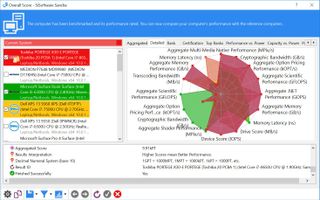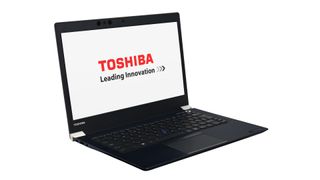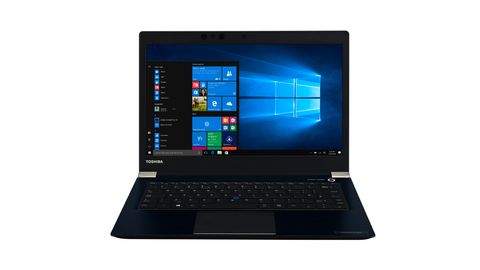Why you can trust TechRadar
Performance
With an 8th-gen Core i7 CPU at its heart, this machine was unlikely to disappoint when benchmarked. And, true to form, it is a veritable beast unleashed when it comes to raw processing and file manipulation.
A quick scan across the benchmark scores reveals a machine that makes most desktop computers blush, especially when connected to mains power.

As an act of self-preservation, the system automatically throttles back once on battery, but not to the point that it ever becomes unresponsive or ponderous.
Here’s how the Toshiba Portégé X30-E-12H performed in our suite of benchmark tests:
Passmark: 3749.8
Passmark CPU: 9409
CPU-Z: 477.0 (single-thread); 1884.3 (multi-thread)
Geekbench: 5013 (single-core); 15151 (multi-core); 23490 (compute)
Cinebench: OpenGL: 41.64 fps; CPU: 486
CrystalDiskMark: 3080.6 MBps (read); 1238.8 MBps (write)
Novabench: 1484
Atto: 3146 MBps (read, 256mb); 1731 MBps (write, 256mb)
Sisoft Sandra (KPT): 9.91
These numbers are great, with one possible exception being the write speed of the NVMe drive. In our review machine, there was a 1TB Samsung PM961, a design that first previewed back in early 2016.
It was the first SSD to use the Samsung Polaris controller before it reappeared in the 960 Pro and Evo. However, this SSD only uses TLC memory, not the MLC used on the SM961, and therefore the write speed is reduced to almost a third compared to its MLC brother.
Had this design used the Samsung 960 Pro it could have been modestly faster at reading and almost twice as fast at writing.
A factor in selecting the PM961 may have been reducing cost. The 1TB PM961 can be purchased for about £400 ($445), but the same size 960 Pro would cost £568 ($613). Where the Samsung PM961 wins over the 960 Pro and Evo is in raw IOPS, but the new 970 Pro and Evo are even faster.
It’s a minor blight on the fantastic numbers that this machine can deliver, and most users will never realize that it could be even better.
Battery life
Considering the clock speeds available to the Core i7 processor, the amount of RAM installed and the NVMe storage, we reasonably expected that battery life would suffer on this design.
While this isn’t an ‘all day’ runner, unless you like a very long lunch, it ran the PCMark 08 Work test for a projected five hours, and that is a testament to how effectively the machine uses the battery power it has available.

Used in a marginally more intermittent way than the benchmark, it would get you through a working day. Or at least a long commute to and from the city.
On the subject of the battery, or charging, Toshiba added one feature to this machine we must applaud: USB Type-C charging. The mobile space desperately needs to see the back of proprietary chargers, and USB Type-C is probably the way to go.
The sooner others see that using Type-C is a monkey off their collective backs, and not a loss of replacement part revenue, the better for all concerned.
Final verdict
There are plenty of good things in this laptop that would serve any user well, even if it’s overpowered for all but a power-user who wants a desktop experience on the move.
If you want a fully featured notebook with the latest Intel silicon and almost all the bells and whistles, this model is certainly worthy of your consideration.
- Also take a look at the best business laptops of 2018
Mark is an expert on 3D printers, drones and phones. He also covers storage, including SSDs, NAS drives and portable hard drives. He started writing in 1986 and has contributed to MicroMart, PC Format, 3D World, among others.


